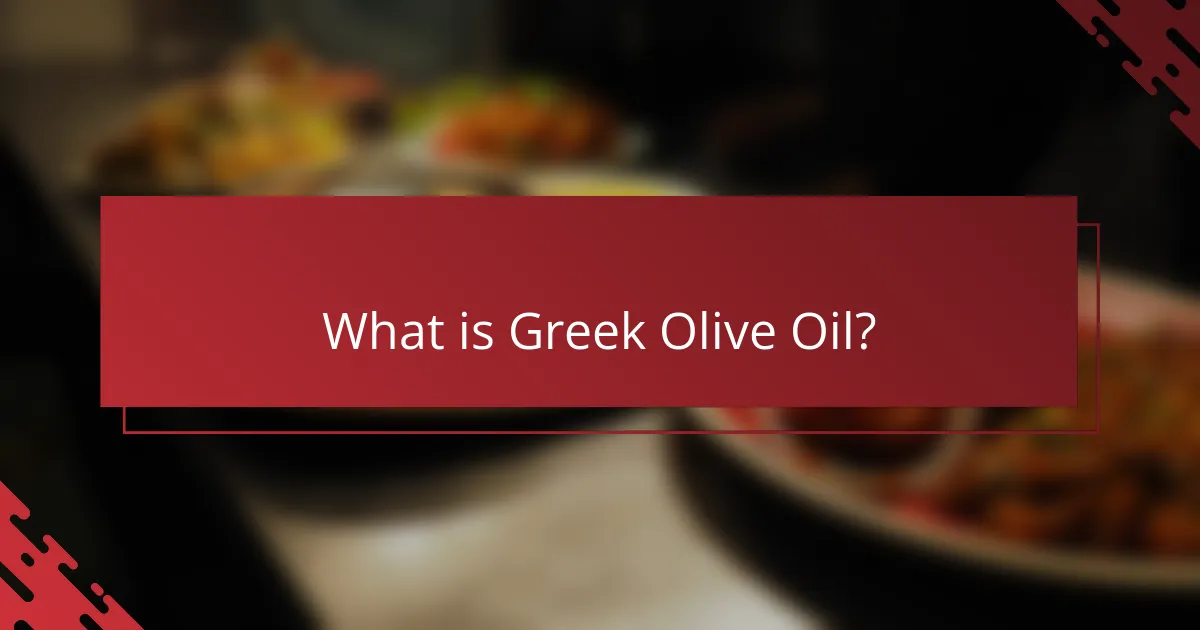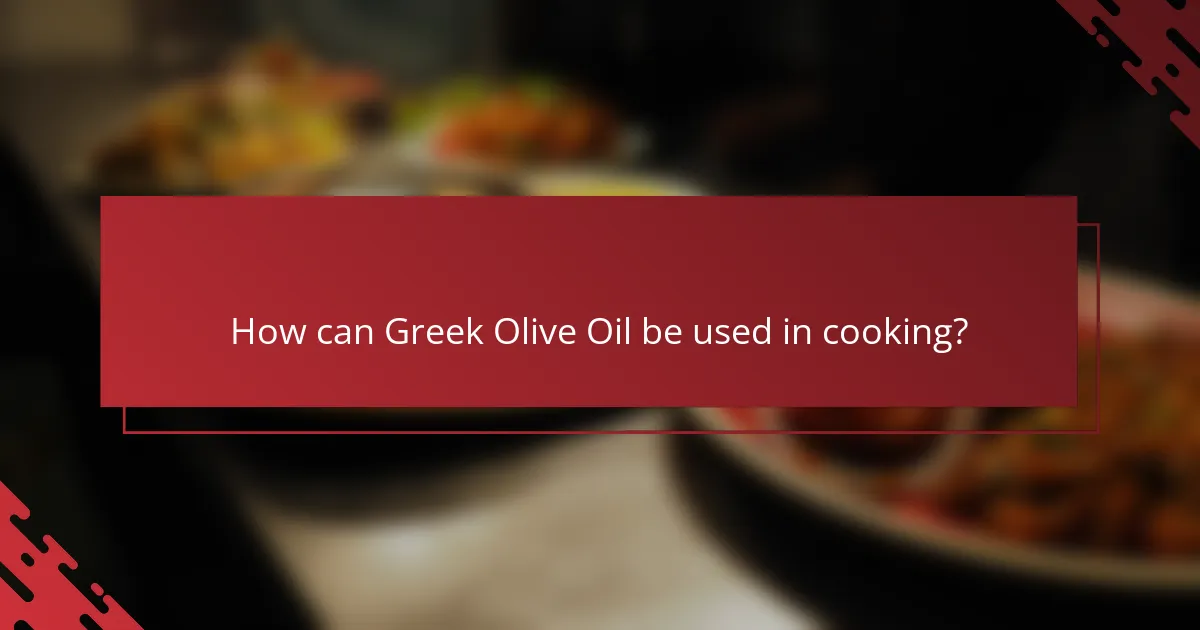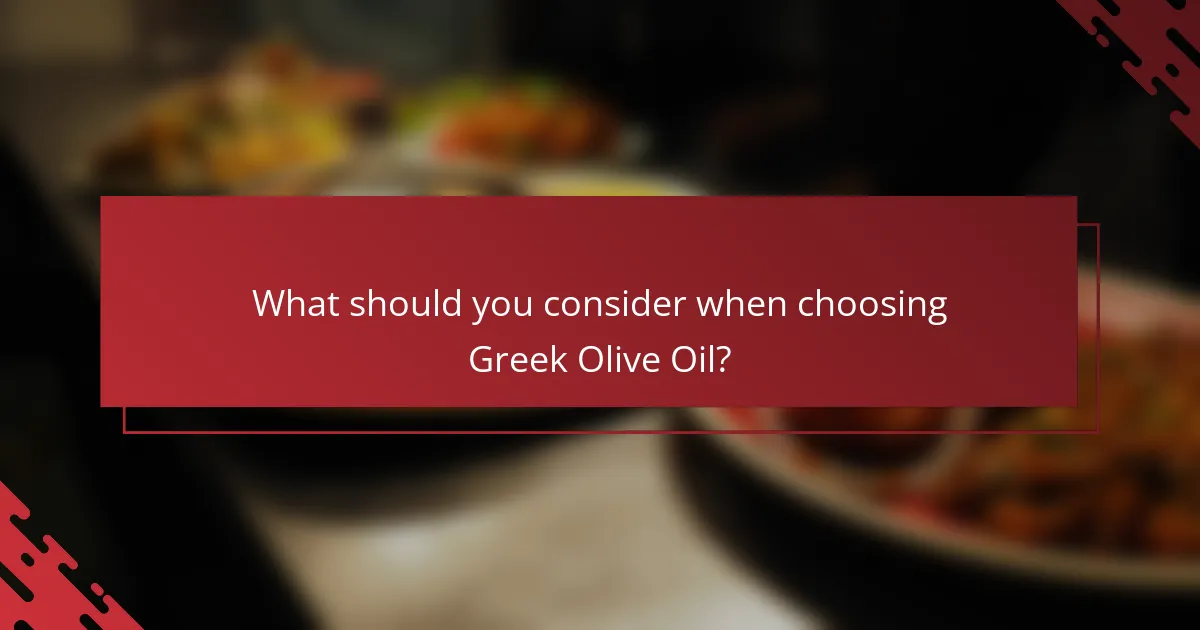Greek olive oil, produced from olives grown in Greece, is recognized for its rich flavor and numerous health benefits. This oil is derived from various olive varieties, notably Koroneiki and Kalamata, and is categorized into extra virgin, virgin, and refined types, with extra virgin being the highest quality. The article explores the culinary versatility of Greek olive oil, detailing its uses in cooking, such as salad dressings, sautéing, marinades, and baking. It also emphasizes the importance of selecting high-quality olive oil by considering factors like origin, olive variety, and packaging. Additionally, the health benefits of Greek olive oil, including its potential to reduce inflammation and heart disease risk, are highlighted.

What is Greek Olive Oil?
Greek olive oil is a high-quality oil produced from olives grown in Greece. It is known for its rich flavor and health benefits. The oil is extracted from various olive varieties, including Koroneiki and Kalamata. Greek olive oil is classified into categories such as extra virgin, virgin, and refined. Extra virgin olive oil is the highest quality, made from cold-pressed olives without chemical processing. It contains high levels of antioxidants and healthy fats. Studies show that Greek olive oil can reduce inflammation and lower the risk of heart disease. Its distinct taste enhances many dishes, making it a staple in Mediterranean cuisine.
How is Greek Olive Oil produced?
Greek olive oil is produced through a careful process of harvesting and pressing olives. The olives are typically hand-picked to avoid damage. They are then washed to remove dirt and debris. After washing, the olives are crushed into a paste using traditional stone mills or modern machinery. This paste is then mixed to facilitate oil extraction. The next step involves pressing the paste to separate the oil from the solid components. The extracted oil is then filtered to remove any remaining impurities. Finally, the oil is stored in dark glass bottles to protect it from light and preserve its quality. This method ensures that Greek olive oil retains its distinct flavor and health benefits.
What are the main steps in the olive oil extraction process?
The main steps in the olive oil extraction process include harvesting, washing, crushing, malaxation, and separation. Harvesting involves gathering ripe olives from the trees. Washing removes dirt and debris from the olives. Crushing breaks down the olives into a paste. Malaxation mixes the paste to help release oil. Separation involves extracting oil from the paste using mechanical or chemical methods. These steps ensure high-quality olive oil production.
What types of olives are commonly used for Greek Olive Oil?
The types of olives commonly used for Greek Olive Oil include Koroneiki, Kalamata, and Manzanilla. Koroneiki olives are the most prevalent for high-quality Greek olive oil. They are small, dark green, and known for their rich flavor and high oil content. Kalamata olives are also popular, recognized for their almond shape and deep purple color. They contribute a fruity and robust flavor to the oil. Manzanilla olives are less common but still used, offering a mild and slightly nutty taste. These olive varieties are integral to the distinct flavor profile of Greek olive oil.
What are the flavor notes of Greek Olive Oil?
Greek olive oil typically exhibits a range of flavor notes. Commonly, it has a fruity flavor, often described as green or ripe. This oil may also present herbal undertones, such as grass or leaves. Spicy notes are frequently noted, providing a peppery finish. Additionally, some varieties offer a nutty or buttery taste. The flavor profile can vary by region and olive variety. For instance, Koroneiki olives are known for their robust flavor. The quality of Greek olive oil is often assessed through tasting panels, confirming these distinct flavor notes.
How do different varieties of Greek Olive Oil differ in taste?
Different varieties of Greek olive oil differ in taste due to their unique olive cultivars and production methods. For instance, Koroneiki olives produce a robust, fruity flavor with peppery notes. In contrast, Kalamata olives yield a milder, more buttery taste. Other varieties, like Manzanilla, offer a grassy and slightly nutty flavor profile. The region where the olives are grown also influences taste. Coastal areas may impart a more saline flavor, while mountainous regions produce oils with a more intense herbaceous quality. Additionally, the time of harvest affects taste; early harvest oils tend to be more pungent and bitter. These variations contribute to a diverse range of flavor experiences in Greek olive oils.
What factors influence the flavor profile of Greek Olive Oil?
The flavor profile of Greek olive oil is influenced by several key factors. The variety of olive used plays a significant role. Different olive cultivars, such as Koroneiki and Kalamata, impart distinct flavors. The region of cultivation also affects taste due to variations in soil and climate. For example, oils from Crete may have different flavor notes compared to those from Peloponnese.
Harvest time is crucial as well. Early harvesting typically results in a more robust and peppery flavor. Conversely, late-harvested olives yield a milder taste. The extraction method contributes to flavor too. Cold-pressed oils generally retain more aromatic compounds, enhancing the overall flavor profile.
Lastly, storage conditions can impact flavor. Olive oil stored in dark, cool environments maintains its quality longer. These factors collectively shape the unique flavor characteristics of Greek olive oil.
What are the health benefits of Greek Olive Oil?
Greek olive oil is rich in monounsaturated fats, which promote heart health. It contains antioxidants like vitamin E and polyphenols. These compounds help reduce inflammation and oxidative stress. Studies show that regular consumption may lower the risk of chronic diseases. For instance, a study published in the Journal of Nutritional Biochemistry found that olive oil can improve cholesterol levels. Additionally, Greek olive oil has been linked to better cognitive function. Research indicates it may reduce the risk of Alzheimer’s disease. Overall, incorporating Greek olive oil into the diet supports overall health and wellness.
How does Greek Olive Oil contribute to heart health?
Greek olive oil contributes to heart health by being rich in monounsaturated fats. These fats help lower bad cholesterol levels. Lowering bad cholesterol reduces the risk of heart disease. Greek olive oil also contains antioxidants, such as vitamin E and polyphenols. Antioxidants combat oxidative stress, which can harm blood vessels. Research shows that Mediterranean diets, high in olive oil, are linked to lower heart disease rates. A study published in the Journal of the American College of Cardiology found that olive oil consumption is associated with reduced cardiovascular events. Thus, incorporating Greek olive oil into a diet supports overall heart health.
What antioxidants are found in Greek Olive Oil?
Greek olive oil contains several antioxidants, including oleuropein, hydroxytyrosol, and tyrosol. Oleuropein is known for its anti-inflammatory properties. Hydroxytyrosol is recognized for its strong antioxidant capacity. Tyrosol contributes to the overall health benefits of olive oil. These antioxidants help protect against oxidative stress. Studies show that these compounds may reduce the risk of chronic diseases. Greek olive oil is particularly rich in these antioxidants due to its production methods. The high phenolic content is a key feature of authentic Greek olive oil.

How can Greek Olive Oil be used in cooking?
Greek olive oil can be used in cooking for various purposes. It serves as a base for salad dressings, enhancing flavors with its rich taste. Greek olive oil is ideal for sautéing vegetables, providing a healthy fat source. It can be drizzled over grilled meats to add moisture and flavor. Additionally, it works well in marinades, infusing dishes with its unique aroma. Greek olive oil is suitable for baking, contributing to moistness in bread and pastries. Its high smoke point allows for frying without losing nutritional value. Studies show that using olive oil in cooking retains its beneficial compounds, making it a healthy choice.
What are the best culinary uses for Greek Olive Oil?
Greek olive oil is best used for drizzling, sautéing, and dressing salads. It enhances the flavor of dishes due to its rich, fruity profile. Drizzling it over grilled vegetables or meats adds depth. Sautéing with Greek olive oil imparts a distinct taste to stir-fries and sauces. It is also ideal for salad dressings, providing a base for vinaigrettes. Additionally, it can be used in marinades to infuse flavors into proteins. Baking with Greek olive oil can replace butter for a healthier option. Its high smoke point makes it suitable for roasting as well.
How can Greek Olive Oil enhance the flavor of dishes?
Greek Olive Oil enhances the flavor of dishes through its rich, fruity taste and aromatic qualities. It adds depth to salads, marinades, and roasted vegetables. The oil’s robust flavor profile can elevate simple dishes, making them more complex and satisfying. High-quality Greek Olive Oil contains polyphenols, which contribute to its unique taste and health benefits. Studies show that the use of olive oil in cooking can enhance the absorption of flavors from other ingredients. Its low acidity and high smoke point make it ideal for various cooking methods. Overall, Greek Olive Oil is a versatile ingredient that complements a wide range of culinary applications.
What types of cooking methods are suitable for Greek Olive Oil?
Greek olive oil is suitable for various cooking methods. It can be used for sautéing vegetables, where its flavor enhances the dish. Greek olive oil is also ideal for drizzling over salads, adding richness and depth. It works well in marinades, infusing meats and seafood with taste. Baking is another method, as it can replace butter or other oils. Additionally, Greek olive oil is excellent for roasting, providing a crispy texture to vegetables. Its high smoke point allows for frying without compromising flavor. Lastly, it is often used in dressings, maintaining its health benefits and taste.
What are some traditional Greek dishes that feature Olive Oil?
Traditional Greek dishes that feature olive oil include Greek salad, tzatziki, and moussaka. Greek salad consists of tomatoes, cucumbers, onions, and feta cheese, all drizzled with olive oil. Tzatziki is a yogurt-based dip that incorporates olive oil for added richness. Moussaka is a layered dish of eggplant, minced meat, and béchamel sauce, often prepared with olive oil. Other notable dishes include spanakopita, which is a spinach pie made with olive oil-rich phyllo dough, and dolmades, grape leaves stuffed with rice and herbs, typically served with olive oil. These dishes highlight the essential role of olive oil in Greek cuisine, enhancing flavor and nutrition.
How is Greek Olive Oil used in salads and dressings?
Greek olive oil is commonly used as a key ingredient in salads and dressings. It adds rich flavor and enhances the overall taste of dishes. Typically, it serves as a base for vinaigrettes, combining with vinegar or lemon juice. The oil can also be drizzled directly over fresh salads to enrich their flavor. Many chefs recommend using high-quality extra virgin Greek olive oil for its distinct taste. Studies show that this oil contains healthy fats and antioxidants, making it a nutritious choice. Its use in Mediterranean diets is well-documented, promoting heart health and overall wellness.
What role does Greek Olive Oil play in Mediterranean cuisine?
Greek olive oil is a fundamental component of Mediterranean cuisine. It is used in various dishes, enhancing flavors and providing health benefits. Its rich taste complements salads, meats, and vegetables. Greek olive oil is also a key ingredient in traditional dressings and marinades. The oil’s high monounsaturated fat content supports heart health. Furthermore, it contains antioxidants that contribute to overall wellness. Studies show that Mediterranean diets rich in olive oil are associated with lower rates of chronic diseases. Thus, Greek olive oil plays a crucial role in both flavor and nutrition within Mediterranean cuisine.

What should you consider when choosing Greek Olive Oil?
When choosing Greek olive oil, consider its quality, origin, and flavor profile. Look for extra virgin olive oil, which indicates the highest quality. Check for the harvest date on the label; fresher oil has better flavor and health benefits. Consider the region of origin, as different areas in Greece produce distinct flavors. Note the olive variety used; popular ones include Koroneiki and Kalamata. Assess the packaging; dark glass bottles protect oil from light degradation. Lastly, taste the oil; it should have a balance of fruitiness, bitterness, and pungency.
How can you identify high-quality Greek Olive Oil?
High-quality Greek olive oil can be identified by several key factors. Look for extra virgin olive oil, which indicates the highest quality. Check for a harvest date on the label; fresher oil is generally better. Assess the color; high-quality oils range from green to golden yellow. Smell the oil; it should have a fruity aroma with hints of grass or herbs. Taste the oil; it should be robust with a peppery finish. Examine the packaging; dark glass bottles protect oil from light. Research the producer; reputable brands often provide traceability and quality certifications. These characteristics are consistent with industry standards for premium olive oil, ensuring authenticity and quality.
What labels or certifications should you look for?
Look for labels such as “PDO” (Protected Designation of Origin) and “PGI” (Protected Geographical Indication). These certifications ensure authenticity and quality of Greek olive oil. PDO indicates that the oil is produced, processed, and prepared in a specific region, adhering to strict quality standards. PGI signifies that at least one stage of production occurs in the designated area. Additionally, organic certifications confirm that the olives are grown without synthetic pesticides or fertilizers. These labels guarantee the oil’s origin, production methods, and adherence to quality standards.
How does the packaging affect the quality of Greek Olive Oil?
Packaging significantly affects the quality of Greek olive oil. Proper packaging protects the oil from light, air, and heat. These elements can degrade the oil’s flavor and nutritional properties. Dark glass bottles or tins are preferred for protection. They minimize exposure to UV light, which can cause oxidation. Oxygen exposure can lead to rancidity, diminishing quality. Additionally, airtight seals help maintain freshness. Research shows that olive oil in clear bottles deteriorates faster than in dark containers. Therefore, the choice of packaging is crucial for preserving quality.
What are some tips for storing Greek Olive Oil?
Store Greek olive oil in a cool, dark place. Exposure to light and heat can degrade its quality. Use a dark glass or stainless steel container to protect it from UV rays. Ensure the lid is tightly sealed to prevent oxidation. Avoid storing olive oil near the stove or in warm areas. The ideal storage temperature is between 60°F and 75°F. Consuming olive oil within 18 months of opening maintains its flavor and health benefits. These practices help preserve the oil’s freshness and nutritional properties.
How can you maintain the freshness of Greek Olive Oil?
To maintain the freshness of Greek olive oil, store it in a cool, dark place. Exposure to light and heat can degrade its quality. Use a tightly sealed container to minimize air exposure. Glass bottles or stainless steel containers are ideal. Avoid storing olive oil near the stove or other heat sources. Check the oil’s harvest date; fresher oil has better flavor and health benefits. Consuming olive oil within 18 months of harvest ensures optimal freshness.
What are the common mistakes to avoid when storing Greek Olive Oil?
Common mistakes to avoid when storing Greek olive oil include exposure to light, heat, and air. Storing olive oil in clear bottles can lead to degradation from light. Heat sources, such as stoves or direct sunlight, can also negatively impact its quality. Additionally, leaving the bottle open allows air to enter, which can cause oxidation. Using the oil past its expiration date is another mistake. Olive oil typically has a shelf life of 18 to 24 months. Finally, failing to seal the bottle properly can lead to spoilage. Proper storage in a cool, dark place and in a sealed container helps maintain its freshness and flavor.
Greek olive oil is a high-quality oil derived from olives grown in Greece, recognized for its rich flavor and numerous health benefits. The article details the production process, including harvesting, washing, crushing, and separating the oil, along with the various olive varieties such as Koroneiki and Kalamata that contribute to its unique taste. It also explores the health benefits associated with Greek olive oil, including its role in promoting heart health and reducing inflammation, as well as its culinary applications in Mediterranean cuisine. Additionally, the article provides guidance on selecting, storing, and identifying high-quality Greek olive oil, ensuring readers are well-informed about this essential ingredient.